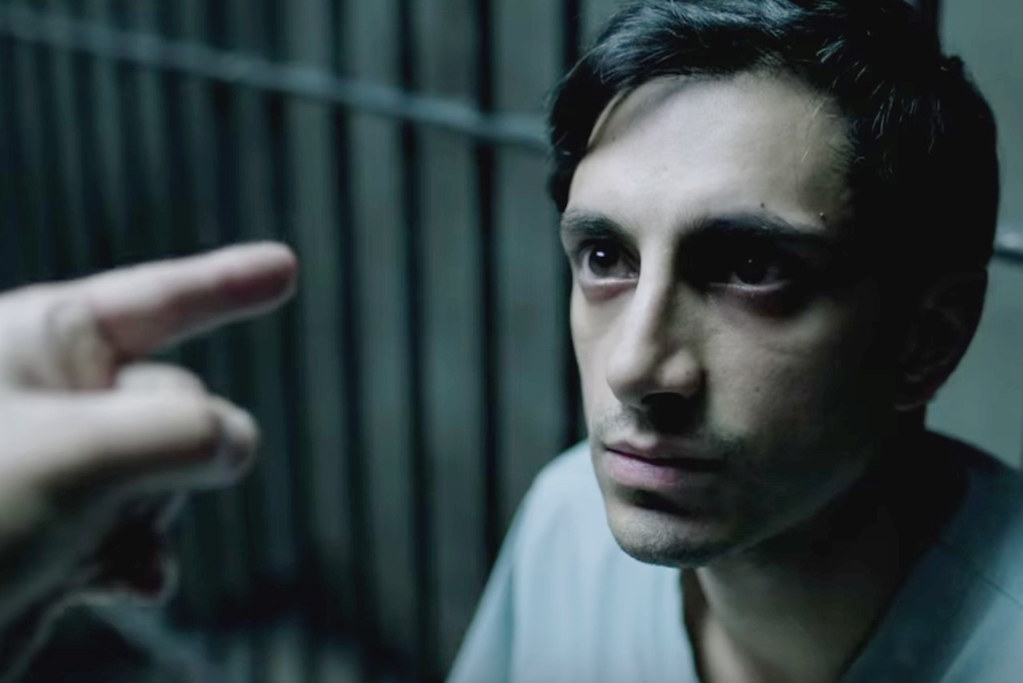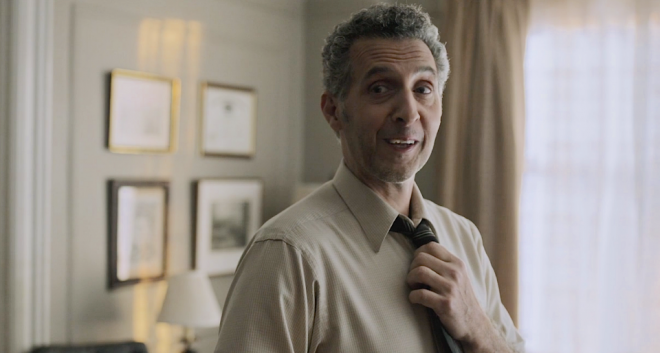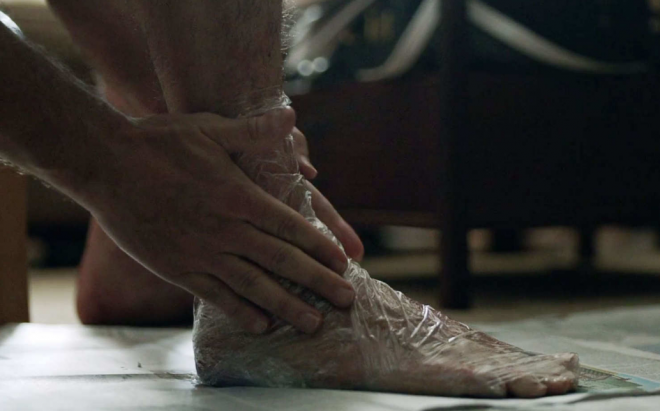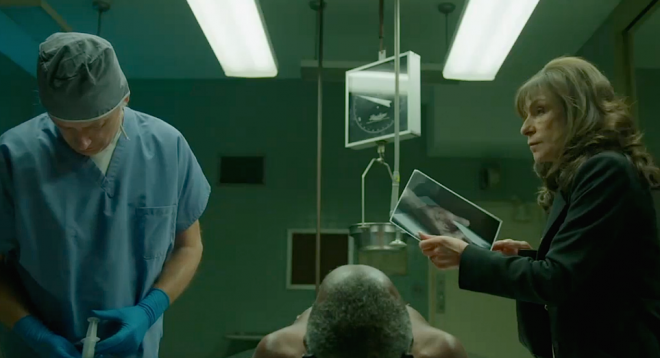How ‘The Night Of’ Became One Of The Most Subtle Beasts On TV
This isn't your average whodunnit.

This post discusses (but doesn’t really spoil) the plot of The Night Of‘s first six episodes
–
There’s a two-line exchange in episode four of The Night Of that perfectly distills the prevailing mood of this new HBO miniseries. District attorney Helen Weiss, played with a battle-hardened aversion to bullshit by Jeannie Berlin, is smoking in a courtroom stairwell. She’s just agreed to a plea deal that offers sympathetic terms to Nasir ‘Naz’ Khan (Riz Ahmed), who may or may not have committed murder in episode one. Dennis Box (Bill Camp), the harried detective trying to pin Naz to the crime, is standing a few stairs up, chiding Weiss about the D.A.’s reluctance to take a killer to trial. “You’re so predictable,” he says by way of farewell, prompting her immediate rebuke: “And you’re not?”
The Night Of, which is currently airing on Foxtel’s Showcase channel, is now six episodes into its eight-part run. The first agonising hour sets us up for a New York whodunnit, spun from that uncomfortable HBO trope of grisly violence against women. We meet Naz: a Pakistani-American college student living in Queens who borrows his Dad’s taxi for a night out. He then meets the beguiling Andrea Cornish (Sofia Black-D’Elia), and ends up the main suspect in her murder. The set-up is both gripping and nearly unbearable to watch.
In the five hours that follow, however, The Night Of has revealed itself as a different kind of crime show — one that draws its drama from people acting predictably. It’s telling that HBO’s latest prestige product is loosely based on a five-episode British series called Criminal Justice. That title has been discarded, but its quotidian spirit is still very much intact.
–
The Horror Of The Everyday
For much of the series so far, The Night Of creators Richard Price and Steve Zaillian have seemed less interested in the salacious crime itself than the painful grind of the judicial system which follows. After his life is altered overnight, Naz must negotiate a terrifying new world with an alien set of rules, but Price and Zaillian have a clear-eyed view of the other side too with lawyers, judges, cops and criminals all making their predictable moves to get through the day. In showing these work-a-day manoeuvres — some self-serving, some noble, all feeling true to life — The Night Of has developed its own assured rhythm.
We first witness Price and Zaillian’s command of this world in episode one, after Naz’s horror night lands him in a Manhattan police station staffed by a weary cast of characters. Night sergeant Klein (Ben Shenkman) is hoping nothing too complicated comes through the door. The first cops at the murder scene, Wiggins (Afton Williamson) and Maldonado (Joshua Bitton), have pulled a double shift and just want to go home. Then there’s Detective Box, summoned from his bed in the dead of night and hoping to coax out a confession by sunrise.
Into this scene shambles the always-welcome John Turturro as John Stone, a beat-down lawyer who advertises his services on the subway with the promise of “No Fee ‘Til You’re Free” in both English and Spanish. If there’s anyone who can sell the humanity of an ambulance chaser, it’s Turturro. Stone sees an opportunity in Naz and announces himself as the defendant’s lawyer. No one — from Detective Box to the D.A. to his ex-wife — believes he’s qualified for the job. “Friend of the family, or right place, right time?” a judge asks Stone in court.

Think Saul Goodman in the big city.
However it’s Stone, more than any other player in the system, who’s chafing against his predictable way of doing things. A rival attorney dismisses Stone as “barely a lawyer” who wants all his sleazy cases over fast so he can move on to the next sex worker or drug dealer. This time he sees an opportunity to finally do it right, with all the painstaking legwork required. Though he stumbles into it at first, Naz eventually presents both a pay cheque and a personal mission.
James Gandolfini was originally slated to play John Stone before his death in 2013, and it’s fascinating to imagine him in the role, trading the brawn of Tony Soprano for the heavy-heartedness he brought to Enough Said or Killing Them Softly. Robert De Niro was then briefly attached, before scheduling conflicts set him on a course to Dirty Grandpa purgatory. Now it’s hard to imagine anyone but Turturro as this show’s moral centre.
The character is saddled with several indignities, including what is undoubtedly TV’s most alarming case of eczema. The skin condition plaguing Stone’s feet — often shown in forensic close-up, lucky us! — is just another obstacle conspiring against him. When an unsympathetic doctor advises a treatment of vegetable oil and plastic wrap, Stone squelches to court, somehow more diminished than usual. As his ailment worsens, Stone cycles through various medical professionals, each of them more gleefully callous than the last.

(Sorry)
It’d be easy to play this guy as a sad sack, but Turturro brings gallows humour and an acerbic streak to the role. (His early exchanges with Chandra, a junior lawyer played by Amara Karan, are particularly prickly). John Stone is revealed in subtle strokes, not grand gestures. How many crime shows would show a lawyer borrowing salt from a street cart to season his home-prepared hard-boiled egg?

Yeah. Okay. But probably just this one.
–
A Familiar World
Shades of all this can be found in most of Price and Zaillian’s prior work. Zaillian is a Hollywood lifer with several prestigious (and often gritty) screenplays to his name, including Schindler’s List and Gangs of New York. Price also has his share of movie and TV credits, but it’s his 2008 novel Lush Life, revolving around a murder in New York’s Lower East Side, that most echoes The Night Of. Price’s mastery of dialogue powers the novel, with its overlapping patter of jaded cops, petty criminals, unreliable witnesses and New York oddballs. Price is the sole credited writer of The Night Of‘s first four episodes, and he revisits several of his novel’s linguistic beats, such as a medical examiner warning a parent that autopsy photos won’t capture their child in the “best light.”
It’s significant that Price and Zaillian’s miniseries follows the phenomenal success of both Serial and Making a Murderer too. While any overlap between those cultural sensations and The Night Of is coincidental — HBO was already filming when Serial turned up — they all share a common whodunnit hook. With the true crime of Serial and Making a Murderer, our deep and sometimes obsessive interest was largely about answering a real-life question. Is Adnan Syed a killer or another victim of an unjust justice system? Was Steven Avery elaborately framed or rightly convicted of murder?
While The Night Of compels us with the same need to know, Price and Zaillian are using the freedom of fiction to muddy our expectations. In Lush Life, Price spends over 400 pages racing towards a murder conviction, but there’s no last-minute twist or grand revelation. What matters are all the details along the way. The Night Of shares that sensibility, and it’s testament to the talents of both creators that the slow clogs of justice make for such compelling TV.
–
The Making Of A Murder Mystery
Six hours in, The Night Of finds Naz navigating two different worlds, both of them fraught. In the courtroom, he’s faced with the fallout from refusing a plea deal. Inside New York’s notorious Rikers Island correctional facility, his troubles are more urgent. Marked as a rapist and murderer, he’s forced to accept protection from Freddy, a string-pulling prisoner played with sly threat by Michael K. Williams. Where Stone wants to paint Naz as a “good boy”, Freddy only sees his simmering rage.
The scenes inside Rikers are a reminder of just how oppressive this show can be. For every flash of levity we get from Turturro, there’s a moment of bracing violence to darken the mood. (Special mention for squirminess should go to episode five’s morgue scene, in which Helen Weiss rests a photo above the crotch of a corpse. That’s certainly one way to answer criticism that there’s not enough dicks on HBO.)

[Dick pic redacted]
Thanks to casting directors Sabrina Hyman and Avy Kaufman, the miniseries is also crowded with fine performances. At times it feels like the cast was corralled at HBO’s Christmas party, as alumni of The Wire, The Sopranos, Veep and Boardwalk Empire turn up in a parade of minor roles. Some of the quietest turns are the strongest, with Peyman Moaadi and Poorna Jagannathan particularly affecting as Naz’s parents.
It’s the casting, too, that makes The Night Of feel unmistakably grounded in New York. Price and Zaillian aren’t inclined to set a scene with establishing shots of the Empire State Building. Instead we know it’s New York from the faces — an assortment of different backgrounds and beliefs all negotiating the same city streets.
Because it’s set in this New York world of cops and courtrooms, The Night Of also can’t avoid the shadow of Law & Order. In fact, you can imagine the NBC show tying up the murder case of Andrea Cornish in one neat 40-minute episode. In the press tour for The Night Of, Price directly addressed the comparison, calling their show “the antithesis of Law & Order“. “It’s not like, put it in the microwave, hit 60 seconds and serve,” he said.
By favouring a slow simmer over a microwave blast, the show finds room for some indelible moments. In episode six, Chandra visits the macabre workplace of a hearse driver who might be a viable suspect. It’s the kind of exchange you wouldn’t blink at in Law & Order, but it’s spectacularly tense in the hands of Zaillian and Price. We also see the jury briefing for Naz’s trial, with a dreary video playing to an audience that’s equal parts indifferent and asleep. The small scene is both funny and tinged with dread. It’s in these acute observations that the show feels closer to Sally Wainwright’s celebrated BBC One series Happy Valley. It’s a show where violence is messy, police work is unglamorous and regular people do ugly things.
The Night Of has however been criticised in the same way as Law & Order for using a woman’s murder as an easy device, with the victim all but disappearing as the procedural gets underway. While details of Andrea’s life have come into focus in recent episodes, it remains an uneasy element of the show that could still take a turn in its final stretch.
With two hours left, The Night Of finds Naz a very different presence from the wide-eyed kid we met in episode one. Is the system changing him irrecoverably, or unlocking a darkness that was already there? This tension now feels as important as the question of “Did Naz do it?” The rules of the genre dictate we’ll get answers to the central mystery, but the show is in no hurry to show its hand. Instead we’re left lingering on Freddy’s subtle manipulations and John Stone’s bout of existential eczema. In trading the sensational for a slow burn, The Night Of has become truly unpredictable TV.
–
The Night Of is on at 8.30pm Sundays on Showcase.
–
Jack Tregoning is a freelance writer based in New York. He tweets at @JackTregoning.